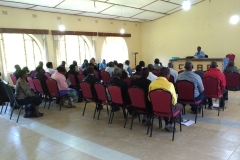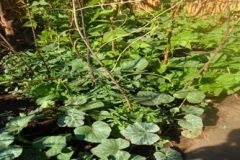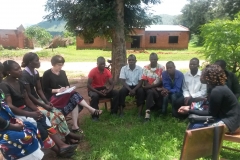A letter from Luta and Jeremy Garbat-Welch serving in Malawi
March 2017
Write: Jeremy Garbat-Welch
Write: Luta Garbat-Welch
Individuals: Give online to E200515 for Jeremy and Luta Garbat-Welch’s sending and support
Congregations: Give to D507577 for Jeremy and Luta Garbat-Welch’s sending and support
Churches are asked to send donations through your congregation’s normal receiving site (this is usually your presbytery).
Dear Brothers and Sisters in Christ:
As we spent this last year in the US, Malawi remained heavily in our thoughts as we continued to hear reports of the hunger crisis caused by a drought that hit much of southern Africa. In 2016, some 6.5 million Malawians (40% of the population) were estimated to be food insecure after the drought crippled maize crops (the staple food) across the country. The year 2016 followed directly on the heels of a smaller hunger crisis in 2015 that saw 3 million Malawians experiencing food insecurity. The World Food Programme stated that the 2016 hunger crisis was “set to become the largest ever emergency food relief operation in the country’s history.” The communities engaging in Community Health Evangelism (CHE) with Nkhoma Synod were particularly on our minds, as we knew that they had identified food insecurity as a top issue and had begun initiating small positive changes to address this issue. For subsistence farmers, making farming changes can literally be a life-or-death risk. Change does not come easily.
When we met with the CHE trainers in February, typically one of the leanest months of the year, there were big questions: Would these changes have made enough of a difference in a relatively short time during such a severe hunger crisis? Would the communities have seen the benefits of CHE or would the hunger crisis have caused discouragement? The report we received was filled with encouragement—one community using a maize silo (a spare room in a community member’s house) had turned into six communities, and plans were in the works to build a separate building for maize storage. Families who had applied compost to their maize fields and begun kitchen gardens not only did not go hungry, but their maize yields were higher than in years past. We heard several stories of families who weren’t interested in being a part of the CHE work deciding to join the rest of the community when they began to see the changes in their neighbors’ lives. Because CHE is a development model that integrates the physical and the spiritual in all aspects, many individuals are coming to Christ, and Bible study groups are being formed to disciple these new Christians. Our meeting was filled with joy as we learned of the transformations taking place in people’s lives. Isaiah 65:19 was the refrain often in my mind:
I will rejoice over Jerusalem
and delight in my people.
And the sound of weeping and crying
will be heard in it no more.
The transformations experienced in these villages (which have grown from eight to 19) have come from education, the deep thoughtful engagement of these communities, and the accompaniment of the CHE trainers in facilitating conversations and providing education. Because these changes are a direct result of the communities themselves, these changes will be long-lasting. These are the changes that will bring transformation.
Another encouragement we’ve experienced is the ability for Jeremy to engage in some chaplaincy training with Nkhoma and Blantyre synods. A visit from Debbie Braaksma, Area Coordinator for Africa, opened up the opportunity for Jeremy to visit the Blantyre Synod prison chaplains. Blantyre Synod has recently expanded the Prison Chaplaincy department, splitting their region into two and going from one full-time chaplain to two full-time chaplains. Jeremy had heard encouraging things about the chaplains and their ministry but had never met them. Through meeting with chaplain Rev. Stanley Chimeysa, Jeremy was given the opportunity to participate in and teach at a prison chaplain training seminar held by Nkhoma Synod in March. At the training, organized by Rev. Wycliffe Zulu, the Lilongwe/Nkhoma Prison chaplain, Jeremy spoke on “Counseling and Discipleship” to a group of 40 lay ministers from various churches in the Nkhoma Synod.
The structure of the prison lay ministry bears reflection—each congregation involved in the Prison Chaplaincy Department has put together a prison ministry committee. Members in each committee are responsible for coordinating the congregation’s ministry efforts for one of the prisons. There are a number of prisons that fall under the jurisdiction of Rev. Zulu, and he assigns the congregations as needed. The goals for ministry in the strategic plan include evangelizing and discipling prison inmates; handing out supplies such as mattresses, toiletries, medicine, and food; distributing Bibles; and holding counseling sessions. Seeing the passion and vision that the Prison Chaplaincy Department has and seeing the engagement that various congregations are committing to made the weekend an encouraging one. Such passion, vision, and engagement give hope that a lay-driven chaplain ministry is possible, not only in the prisons but perhaps also in the hospitals. Currently there are very few full-time chaplains appointed by the various synods of the CCAP, and a major barrier appears to be finances. A decentralized model in which each local congregation is given the responsibility of “chaplain” for a nearby prison or hospital reduces the burden of time and financial cost on current full-time chaplains.
While we enjoyed the time we had seeing family and friends in the US, as well as the opportunity to build and strengthen our connection with supporters and churches, being away from Malawi for a year was discouraging. We left Malawi just when we thought we were making good connections and headway in ministry. We left just when water, energy, and food crises were building. We wondered what kind of situation we would return to. It has been a great encouragement to return to find that those connections haven’t died but have created a foundation that we can continue to build on, and that the foundations of our church partners continue to bear fruit even in times of crisis.
Thank you for your prayers for us, for our partner churches, and for the people our partner churches serve. Thank you for your generous financial support, which contributes greatly to the positive changes we have seen in Malawi. Please join us in celebrating the steadfastness of God’s spirit.
In Christ’s Service,
Luta, Jeremy, Jathniel, and Azai
![]() You may freely reuse and distribute this article in its entirety for non-commercial purposes in any medium. Please include author attribution, photography credits, and a link to the original article. This work is licensed under a Creative Commons Attribution-NonCommercial-NoDeratives 4.0 International License.
You may freely reuse and distribute this article in its entirety for non-commercial purposes in any medium. Please include author attribution, photography credits, and a link to the original article. This work is licensed under a Creative Commons Attribution-NonCommercial-NoDeratives 4.0 International License.


